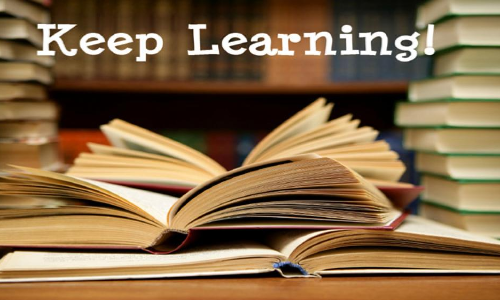Live
- Manipur violence: Assam Police mount 24x7 vigil along inter-state border
- The Impact of Wellness Programs on Employee Engagement and Retention
- IS claims responsibility for deadly attack in Afghanistan
- The Future of MSMEs: Embracing Innovation and Sustainability for Growth
- Army chief returns from Nepal after defence cooperation talks
- ‘Vikatakavi’ shines at IFFI, Goa
- Tamannaah highlights the strengths of south Indian cinema
- Shivanna’s ‘BhairathiRanagal’ locks Telugu release date
- Startup Ecosystem and Technology: Revolutionizing India’s Retail Fashion
- SDT’s ‘Satya’looks favorite at Filmfare Short Film Awards 2024
Just In

One of the greatest exponents of High Renaissance, Michelangelo signed a phrase, ‘ancora imparo’, into many of his works. It is Italian for “I am still learning”.
One of the greatest exponents of High Renaissance, Michelangelo signed a phrase, ‘ancora imparo’, into many of his works. It is Italian for “I am still learning”.
As the creator of St Peter's Basilica demonstrated time and again, the key to success is having an insatiable appetite for learning. A great leader is one who imbibes in him and inculcates in others a culture of learning, irrespective of the stature one has achieved.
A statement, “Only two things are infinite-the universe and human stupidity, and, I am not sure about the former” is attributed to Albert Einstein.
It’s true! Man is also an animal, a social animal. The word social ceases to exist the moment we stop learning. Four characteristics of early man differentiated him from other creatures in the universe; some of them are much fiercer.
Man has an ability to coordinate between brain and other organs of the body. Every species tends to live together.
Man has transformed it into societal living. Every living thing makes some sounds, some of them we may not be able to hear.
But, man gave them a meaning and developed it into a language. Curiosity and logical thinking are critical for learning, which are innate traits only human beings possess.
American author, Zig Ziglar said, “If you are not willing to learn, no one can help you. If you are determined to learn, no one can stop you.”
Indeed, we often get many a learning moment.
Explains Bill Taylor in an article, ‘How WD-40 Created a Learning-Obsessed Company Culture’, Harvard Business Review, many such learning moments include a period of frustration, a burst of inspiration, a breakthrough of collaboration in which people stumble upon a problem, unearth an opportunity, or fail miserably at an initiative, and then communicate what they’ve learned without fear of reprisal. This is precisely the spark that ignites a scientific mind.
As parents we get a thrill when our children enthusiastically recount their first day’s experience in school or college. But, as we get caught in the whirlpool of professional life, curiosity takes a backseat.
It means we are not learning with the same pace as we did in the beginning. Improvement flows from continuous learning. One should be a life-time learner.
One day, the then director of Birla Institute of Technology and Sciences (BITS), Hyderabad, Prof. VS Rao, who is the current President of NIIT University, said that he joined an online course in calculus.
Come to think of it, he has specialised in Organic Chemistry, Drug Design and Synthesis, and Green Chemistry. Pursuing a course in a branch of mathematics and that too when nearer to retirement that deserves appreciation. He will not get any promotion or increment. But, a sheer thirst for learning will bring him untold joy.
I am sure you will be excited to see or meet your role-model; when your favourite dish is served during dinner or when going on the long-pending holiday. In a similar vein, why is that learning something new does not invigorate our sense?
Learning is a stimulant for learning. It’s an infectious attribute. As you learn, new questions emerge. As you answer them, new questions confront you. Thus the chain reaction in you attains criticality.
Closely observe a child’s behaviour. The child is always curious to imitate something he sees. His crazy to experiment is so high that he becomes oblivious of the consequences.
The quest to tread a new path is the reason the child hates doing encores or using the same toy. Unfortunately, as we embrace adulthood with pride and confidence, knowingly or unknowingly we shed the wonderful child-like curiosity.
What enthuses learning? There is voluminous research on this. Tom Stafford in an article ‘The Science of Learning’ (www.theguardian.com) quotes a classic study in psychology to explain what stimulates learning.
BF Skinner, father of behaviourism, experimentally proved that schedules of reinforcement, such as the delivery of food pellets to hungry rats, could condition behaviour.
He claimed that any task can be learned using simple associations. In 1995, a team taught pigeons to discriminate between Picasso and Monet paintings.
After a few weeks’ of training, the pigeons could not only tell a Picasso from a Monet–indicated by pecks on a designated button–but could generalise their learning to discriminate cubist from impressionist works in general!
This is the power of practice. When a pigeon could become an art connoisseur through practice, why can’t you and I? We, far more brilliant, can do wonders through practice. This is precisely the reason why some brilliant kids fail to succeed in examinations while those in the mediocrity league conquer.
The villain is the lack of practice. Failing to practice, we forget what we learnt. Failing to learn, we stagnate. During my university studies, I joined a course in French.
On the first day, the teacher taught us two words – Bonjour Monsieur (Good morning sir) and Bonjour Madame (Good morning madam).
She cautioned us that if we fail to practice, perhaps we will remember only these two words. That’s exactly what happened with me. Friends, Bonjour, ancora imparo, let it be our motto.

© 2024 Hyderabad Media House Limited/The Hans India. All rights reserved. Powered by hocalwire.com







